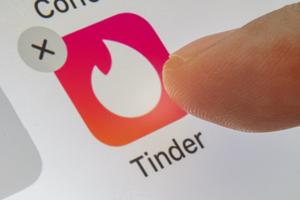Life Advice
/Health

Ask Dating Coach Erika: What if I can't tell what they look like in their profile?
As someone who views hundreds or maybe even thousands of dating profiles per week, let’s just say that I’ve seen a lot of dating profile photos. Too many dating profile photos. So, I know a thing or two about a good photo. I know even more about a bad picture ... and how one seemingly deceptive photo can turn into a left swipe faster than ...Read more

Ask Anna: Am I ungrateful for not matching my boyfriend's gift spending?
Dear Anna,
I’m a 32-year-old woman and my boyfriend (35) of two years is furious with me because I won’t buy him a $750 Christmas gift. Earlier this year, he paid for my daughter’s dental emergency (around $500) and bought me an expensive piece of jewelry for my birthday ($600). (I didn’t ask for it.) He makes significantly more money ...Read more

Ask Dating Coach Erika: What does it mean to date?
Note that I do not take Urban Dictionary as gospel (I’d have problems if I did!), but when it comes to defining the word “dating,” the usually off-color site does a pretty good job. One of the (many!) definitions says,“…to be in the early stages of a relationship where they go out on dates to find out what each other is like, as a ...Read more

Ask Anna: How to handle when your partner and friend don't get along
Dear Anna,
I’m stuck in an uncomfortable spot between two people I care about, and I don’t know how to handle it without blowing something up.
My partner and my closest friend recently got into a pretty heated argument. It wasn’t about our relationship or someone crossing some huge moral line — it was more a clash of personalities and ...Read more

Ask Dating Coach Erika: How do I tell my family to stop asking invasive questions?
Q: My extended family always asks me nosy questions around the holiday season. Is there a way I can tell them not to? And if that doesn’t work, what should I say when they ask? I really don’t want to talk about my love life with them. Thanks!
A: I get it. Even if they have the best intentions, it feels so personal, and often invasive, to be...Read more

Ask Anna: How do you know if early chemistry means anything when he's still dating around?
Dear Anna,
I’m 24 and recently started seeing a guy I’ve had a crush on for six months. We finally went on two dates and both went incredibly well. He was affectionate, introduced me to his friends, cooked me dinner, even cleared a little space on his bathroom shelf for my toothbrush. It all felt very sweet and intentional, and I left his ...Read more

Ask Dating Coach Erika: How do I balance 'You deserve zero red flags' with the reality that no one is perfect?
I got this interesting question recently, and it made me think. And when things make me think, you know I have to write about them!
Q: How do I balance ‘You deserve zero red flags’ with the reality that no one is perfect? Thank you!
A: Those are VERY different things. A red flag, by my definition, is objective: Someone is rude to people. ...Read more

More people are caring for dying loved ones at home. A New Orleans nonprofit is showing them how
Liz Dunnebacke isn’t dying, but for a recent end-of-life care workshop in New Orleans, she pretended to be.
Dunnebacke lay still atop a folding table that was dressed as a bed, complaining that her legs hurt. Registered nurse Ana Kanellos, rolling up two small white towels, demonstrated how to elevate her ankles to ease the pain.
“ Mom�...Read more

Pitch-A-Friend wants you to be the wingmate
MINNEAPOLIS -- Dressed in “Team Lisa” T-shirts, two friends posing as savvy business-minded “Sharks” ran through a tight presentation of why any potential investor in the audience would be smart to date their friend.
“When you invest in Lisa you invest in your own future,” they said, as part of their “Shark Tank”-themed ...Read more

Ask Anna: How do I tell if a guy is moving slowly or wasting my time?
Dear Anna,
I’m 28 and have been seeing a guy around my age for a few months. We clicked fast in conversation — texting every day and even saying good night, sharing long voice notes, that kind of early-stage excitement — but because of work and conflicting schedules, we’ve only managed a handful of actual dates.
Last week was my ...Read more

Ask Dating Coach Erika: How do I ask about his long-term goals?
Today, let’s look at two different questions from two different clients. As always, if one person asks, I can only assume it is applicable to a larger audience.
And, interestingly enough, you’ll see that these questions are applicable to any gender and any age.
Q: I wanted to have a conversation with (him) about his more long-term goals ...Read more

Commentary: Could China's divorce reforms inspire fairer American marriages?
Marriage rates in the United States have plummeted nearly 60% since 1970, hitting historic lows amid rising divorce risks and financial pitfalls. This decline isn’t primarily a gender war but a finance-based crisis: The specter of divorce as a wealth transfer discourages commitment.
Enter China’s bold 2025 divorce law reforms, effective Feb...Read more

Ask Anna: I found a dating app receipt in my girlfriend's email and I'm spiraling
Dear Anna,
I’m a 29-year-old guy and I’ve been with my girlfriend for about a year and a half. We’ve always had what I thought was a solid, committed relationship. We live separately but spend most nights together, talk about future plans, the whole thing. I trusted her completely. Last week, while she was showing me something on her ...Read more

Ask Dating Coach Erika: Should I pay for the dating apps?
Every day, I get the question, from both clients and friends, “Should I pay for the dating apps?” And when they are referring to the apps, they are referring to the ones like Hinge and Bumble where the basic services are free but there are in-app upgrades. (Sites like Match.com and eHarmony require payment in order to communicate with people...Read more

People are dumping Tinder. The dating app wants to reignite its spark with Gen Z
LOS ANGELES — More than a decade ago, Tinder became the hottest dating app, transforming modern romance by making it possible for singles to swipe through people's profiles, match and meet up.
Now, Tinder is fighting to keep the flame alive. Sometimes in unexpected ways.
Last month, it convinced UCLA students to meet in a big group in the ...Read more

People are dumping Tinder. The dating app wants to reignite its spark with Gen Z
LOS ANGELES — More than a decade ago, Tinder became the hottest dating app, transforming modern romance by making it possible for singles to swipe through people's profiles, match and meet up.
Now, Tinder is fighting to keep the flame alive. Sometimes in unexpected ways.
Last month, it convinced UCLA students to meet in a big group in the ...Read more

Ask Anna: What to do when your partner feels insecure about your past
Dear Anna,
I’ve been dating my girlfriend for a little over a year, and for the most part things are great. We’re both pretty sentimental people, but in different ways. I save things — not in a hoarder way, but I’ve kept shoeboxes of old letters, birthday cards and printed photos from past relationships going back to college. I don’t ...Read more

Ask Dating Coach Erika: How do I tell someone I don't want to see them again?
Why is it that something that should seem so easy – telling someone you’re not interested – is so hard for so many people? I certainly understand that no one wants to hurt someone’s feelings. But, in saying nothing (ghosting, if you will), you’re doing a lot more damage to their feelings than simply telling a high-level version of the ...Read more

Ask Anna: My girlfriend gets turned on by outside attention -- what to do?
Dear Anna,
I'm a 31-year-old man in a relationship with my girlfriend (29) for three years. Last week right after we’d had sex, she told me she'd been really turned on earlier that day because a guy at her gym had been flirting with her pretty heavily. She said it like it was just a fun, sexy confession, like she thought I'd find it hot or ...Read more

Ask Dating Coach Erika: How do I write a profile to attract the person I'm looking for?
Writing a dating profile can feel daunting. There’s no disputing that, even if you only have to write 750 characters about yourself (that’s about average for most of the dating apps these days … very short, I know). It’s still hard to figure out which exact 750 characters to share.
Too often, a client comes to me asking, “How do I ...Read more
Popular Stories
- Ask Dating Coach Erika: What if I can't tell what they look like in their profile?
- Ask Anna: Am I ungrateful for not matching my boyfriend's gift spending?
- Ask Dating Coach Erika: What does it mean to date?
- Ask Anna: How to handle when your partner and friend don't get along
- Ask Anna: My girlfriend gets turned on by outside attention -- what to do?













